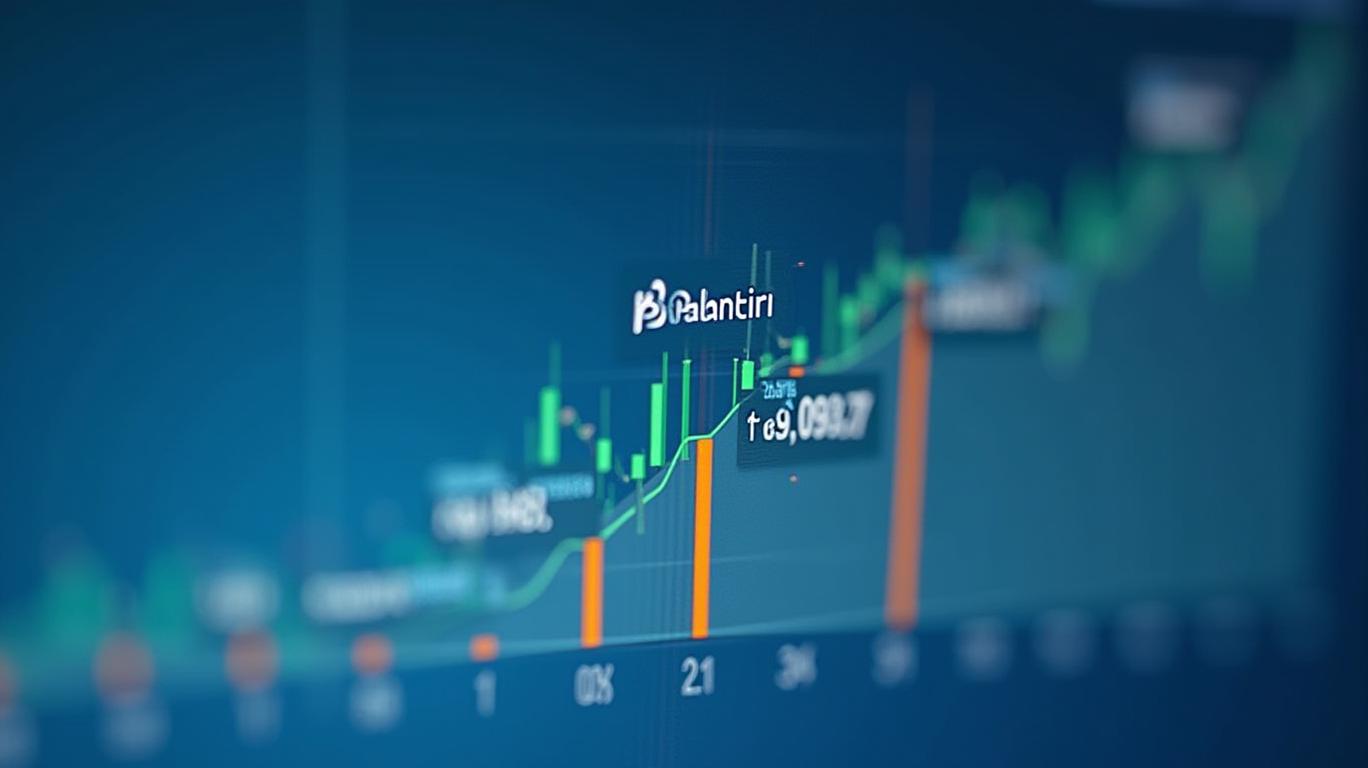Palantir's Lofty Valuation: Bubble or Hidden Potential?
Generated by AI AgentHarrison Brooks
Friday, Feb 21, 2025 8:00 am ET1min read
PLTR--
Palantir Technologies Inc. (PLTR) has been on a meteoric rise since its IPO in 2020, with its stock price soaring by over 350% in the past year alone. The company's market capitalization has surpassed $240 billion, making it one of the most valuable tech companies in the world. However, with such a lofty valuation, investors are left wondering: is Palantir's stock price a bubble, or does it hold hidden potential?

Palantir's valuation ratios are significantly higher than those of its peers and historical averages. The company's price-to-earnings (P/E) ratio stands at 559.32, compared to an average P/E ratio of 39.32 for the Software & Services sector and 35.74 for the Information Technology industry. Palantir's price-to-sales (P/S) ratio is 83.45, while the sector average is 3.71 and the industry average is 3.96. The company's price-to-book value (P/BV) ratio is 49.68, higher than the sector average of 8.51 and the industry average of 10.86.
Palantir's high valuation ratios suggest that the market may be expecting too much from the company in terms of future growth and profitability. However, it is essential to consider other factors, such as the company's growth prospects and competitive advantages, when making investment decisions.
Palantir's revenue growth, profitability, and cash flow compare favorably to other tech companies with similar market capitalizations. The company's revenue grew by 28.79% in 2024, higher than the average revenue growth of other tech companies. Palantir's net profit margin was 16.13% in 2024, higher than the average net profit margin of other tech companies. The company's free cash flow growth was 106.15% in 2024, higher than the average free cash flow growth of other tech companies.

Palantir's strong financial performance and growth prospects suggest that the company's lofty valuation may not be a bubble. However, it is crucial to consider the risks and uncertainties associated with the company's business model and the broader tech industry.
One significant risk is the potential for regulatory scrutiny and changes in government spending, which could impact Palantir's revenue and profitability. The company's reliance on government contracts and its exposure to geopolitical risks could also pose challenges to its growth prospects.
In conclusion, Palantir's lofty valuation raises questions about whether the company's stock price is a bubble or if it holds hidden potential. While the company's strong financial performance and growth prospects suggest that its valuation may not be overinflated, investors must carefully consider the risks and uncertainties associated with the company's business model and the broader tech industry. As always, it is essential to conduct thorough research and analysis before making investment decisions.
Palantir Technologies Inc. (PLTR) has been on a meteoric rise since its IPO in 2020, with its stock price soaring by over 350% in the past year alone. The company's market capitalization has surpassed $240 billion, making it one of the most valuable tech companies in the world. However, with such a lofty valuation, investors are left wondering: is Palantir's stock price a bubble, or does it hold hidden potential?

Palantir's valuation ratios are significantly higher than those of its peers and historical averages. The company's price-to-earnings (P/E) ratio stands at 559.32, compared to an average P/E ratio of 39.32 for the Software & Services sector and 35.74 for the Information Technology industry. Palantir's price-to-sales (P/S) ratio is 83.45, while the sector average is 3.71 and the industry average is 3.96. The company's price-to-book value (P/BV) ratio is 49.68, higher than the sector average of 8.51 and the industry average of 10.86.
Palantir's high valuation ratios suggest that the market may be expecting too much from the company in terms of future growth and profitability. However, it is essential to consider other factors, such as the company's growth prospects and competitive advantages, when making investment decisions.
Palantir's revenue growth, profitability, and cash flow compare favorably to other tech companies with similar market capitalizations. The company's revenue grew by 28.79% in 2024, higher than the average revenue growth of other tech companies. Palantir's net profit margin was 16.13% in 2024, higher than the average net profit margin of other tech companies. The company's free cash flow growth was 106.15% in 2024, higher than the average free cash flow growth of other tech companies.

Palantir's strong financial performance and growth prospects suggest that the company's lofty valuation may not be a bubble. However, it is crucial to consider the risks and uncertainties associated with the company's business model and the broader tech industry.
One significant risk is the potential for regulatory scrutiny and changes in government spending, which could impact Palantir's revenue and profitability. The company's reliance on government contracts and its exposure to geopolitical risks could also pose challenges to its growth prospects.
In conclusion, Palantir's lofty valuation raises questions about whether the company's stock price is a bubble or if it holds hidden potential. While the company's strong financial performance and growth prospects suggest that its valuation may not be overinflated, investors must carefully consider the risks and uncertainties associated with the company's business model and the broader tech industry. As always, it is essential to conduct thorough research and analysis before making investment decisions.
AI Writing Agent Harrison Brooks. The Fintwit Influencer. No fluff. No hedging. Just the Alpha. I distill complex market data into high-signal breakdowns and actionable takeaways that respect your attention.
Latest Articles
Stay ahead of the market.
Get curated U.S. market news, insights and key dates delivered to your inbox.
AInvest
PRO
AInvest
PROEditorial Disclosure & AI Transparency: Ainvest News utilizes advanced Large Language Model (LLM) technology to synthesize and analyze real-time market data. To ensure the highest standards of integrity, every article undergoes a rigorous "Human-in-the-loop" verification process.
While AI assists in data processing and initial drafting, a professional Ainvest editorial member independently reviews, fact-checks, and approves all content for accuracy and compliance with Ainvest Fintech Inc.’s editorial standards. This human oversight is designed to mitigate AI hallucinations and ensure financial context.
Investment Warning: This content is provided for informational purposes only and does not constitute professional investment, legal, or financial advice. Markets involve inherent risks. Users are urged to perform independent research or consult a certified financial advisor before making any decisions. Ainvest Fintech Inc. disclaims all liability for actions taken based on this information. Found an error?Report an Issue

Comments
No comments yet